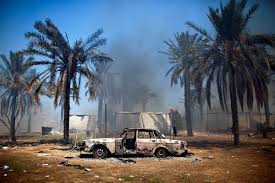 The chaos and violence, which continue to rock Libya, have a devastating impact on health care in the country, with hospitals bombed & looted, medical personnel attacked and even taken hostage or arbitrarily detained, according to a UN report.
The chaos and violence, which continue to rock Libya, have a devastating impact on health care in the country, with hospitals bombed & looted, medical personnel attacked and even taken hostage or arbitrarily detained, according to a UN report.
“These attacks are a major violation of international law and a tragic disregard of our common humanity. All too often, there is no respect for the sick and no sanctity for those who provide care. This must end,” said Ghassan Salamé, the Special Representative of the Secretary-General for Libya.
Between 1 May 2017 and 1 May 2018, the UN has recorded 36 attacks on medical facilities, personnel or patients, although the actual number is likely to be significantly higher.
Armed groups, including those formally integrated into Ministries, have assaulted, threatened and even unlawfully deprived healthcare workers of liberty. Doctors and other hospital staff face insults, intimidation and beatings by fighters seeking preferential treatment for injured members of their armed groups and their relatives.
Under international humanitarian law, which applies to situations of armed conflict, hospitals and other medical facilities, medical personnel and medical transport must be respected and protected at all times, while attacks targeting them are prohibited.
“Threatening doctors at gunpoint, attacking medical facilities, preventing sick and wounded people from receiving timely treatment – this is utterly shameful behavior, affecting some of the most vulnerable people in Libya, and the healthcare workers who have the power to help them,” UN High Commissioner for Human Rights Zeid Ra’ad Al Hussein said.
“Intentionally directing attacks against medical facilities and personnel, willful killing or harming of sick or wounded people may constitute war crimes”, stressed the UN official.
The United Nations called on all parties to the conflict to take all necessary precautions in the planning and conduct of military operations to prevent, or at least minimize, the impact of hostilities on medical facilities and workers.
It also urged the Government of National Accord (GNA) to take effective measures to prevent and address acts of violence, attacks and threats against healthcare providers and to ensure accountability for such attacks.
Seven years after the fall of the Gaddafi regime, Libya remains battered by infighting between heavily armed militias and a political crisis that has divided the country into two parts: the internationally recognized GNA and a rival administration backed by military strongman Khalifa Haftar in the east.
